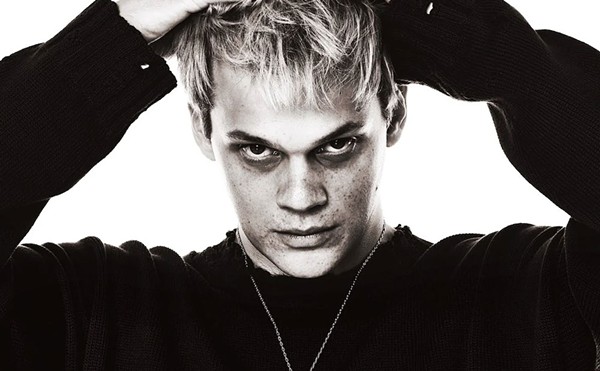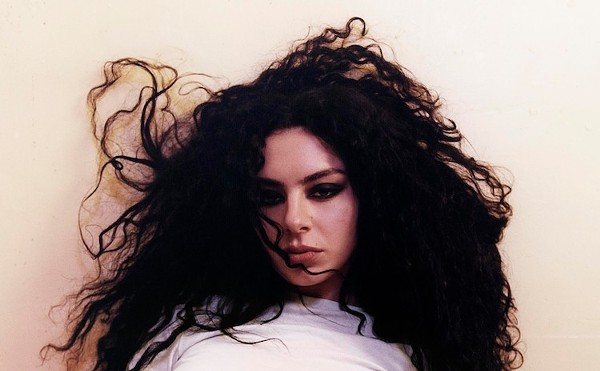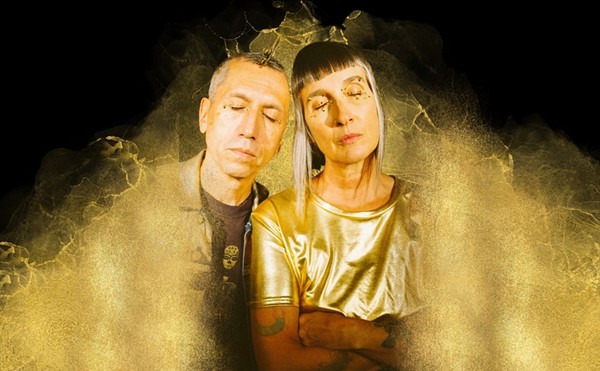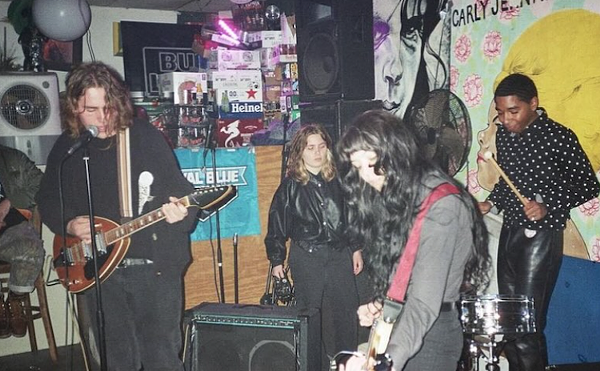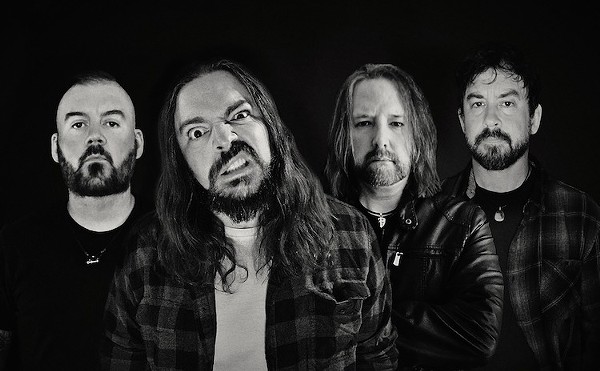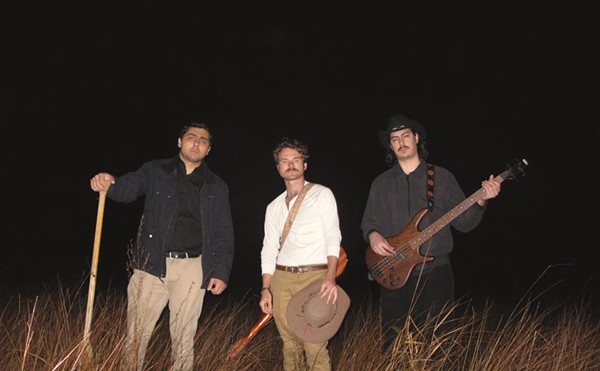It is nearly noon on a balmy spring day that feels more like summer, and famous bass-booty rappers 69 Boyz are giving a pep talk to a more-than-eager standing-room-only Jones High School crowd. After word got out that the Boyz were making a visit to the school, the planned career-day appearance quickly turned into a rowdy Q&A session. The band's "follow your dream" stories had the exuberant crowd whooping and hollering, asking questions like, "Do you have any kids? Do you take care of them?" And every kid left the auditorium with a 69 Boyz sticker, sampler cassette and autograph, all promoting the group's new album, "2069."
That's exactly the kind of street-level excitement that Orlando-based rap group 69 Boyz has enjoyed since they burst onto the South's bubbling bass-rap scene in 1994 -- the stuff that they hope will push to platinum-plus status "2069's" dance-floor candy, due on shelves April 14.
Truth be told, the Boyz are savvy marketers with a solid track record of racking up hits. Originally, "2069" was to debut on the band's independent imprint Homebass Entertainment in March. But a funny thing happened on the way to the CD pressing plant: Universal stepped in and inked a phat distribution deal, the sort usually reserved for heavyweights. The alliance pushed back the release date almost a month, but that hasn't stopped the group's gangbuster new single, "How We Roll," from quickly scaling the charts. The track is currently holding down the No. 5 spot on Billboard's "Hot Rap Singles" chart, something that didn't seem possible in the wake of Master P's No Limit thuggery and Juvenile's Cash Money bandits. The video for the song, shot in Orlando, is making the rounds on BET indie video outlet The Box, even with its well-placed Latin flavor.
"Incredible," says Van "Thrill Da Playa" Bryant, 69 Boyz mastermind, frontman and main songwriter/producer, pushing his seemingly bankable theory on yin and yang in the rap game. "You got to figure when our last album came out, [the rap market] was all No Limit, one particular sound. There was a long period in there when people weren't dancing, especially on the urban side. Now, it's that balance that makes the urban market want to dance. ... Everybody now just wants to dance."
The 69 Boyz, which includes dancers Barry "Fast" Wright and Greg "Slow" Thomas, former 95 South DJ K-Funk and current turntable whiz DJ Fry, came to life after Jacksonville-based rappers the Quad City DJs, who swept the nation with the infectious 1996 crossover smash "C'mon N' Ride It (the Train)," called it quits. The splintered Quad City family sent Bryant, its co-producer and songwriter, further south to scout members for his new project, 69 Boyz, and later, to set up Homebass.
Throughout the years, Bryant has proven himself as the king of bottom-end, writing and producing hits for other unit-moving acts Dis-N-Dat, 95 South, Fraze, Luke and 24K. Bryant even received a Grammy nomination for Quad City's title track from the top-selling soundtrack to the Michael Jordan film "Space Jam."
The first 69 Boyz record, "199Quad," came out on now-defunct Orlando-based Rip-It Records. That 1994 disc went double platinum and scored in the top 15 on Billboard's "Hot R&B" chart, thanks to house-shaking singles like "Tootsie Roll." The 69 Boyz became a household name, forever linked to Southern bass boom.
"Coming in with a new independent label at the time, [the Rip-It Records people] were able to really work the record from a street level," says Bryant. "But that exposure, or that nationwide push, that we felt the majors could give is what we wanted to experience with the second album."
So 69 Boyz transitioned from tiny Rip-It to the larger Quadrasound/Homebass Entertainment/ Big Beat/Atlantic imprint for "The Wait Is Over" (1998). There, the 69 Boyz floundered as Master P's soldiers ran by them on the charts. They were buried in a shifting market that was hungry for "thugging and stuff," says Bryant. "[The market] needed a balance back on this side," he says, referring to the 69 Boyz's proven success with its playfully raunchy but nonviolent rhymes.
So the disappointing experience only encouraged Bryant -- still packing economic clout from his pocketful of previous hits -- to return to the group's independent roots for 2069, releasing it on an invigorated Homebass Entertainment label, now broken away from the muddled mess they encountered at Atlantic.
As Bryant explains it, "The majors weren't able to kill [the band] or keep us out of the marketplace because the Industry needed that balance."
One of Bryant's secret weapons is Homebass general manager James "Dicky" Hazley, considered by many in the industry to be "the father of rap." Hazley's street-level marketing campaigns have taken acts like Miami-based Luke (Luther Campbell of 2 Live Crew) to the top of the charts with little or no radio airplay, in addition to his earlier behind-the-scenes work with legends like Gladys Knight & The Pips.
With its grass-roots marketing machine, Homebass will not only look to re-establish the 69 Boyz as the kings of dance-floor bass-bins but also as a vehicle to launch the label's roster of up-and-coming talent. Homebass will use "2069" and the upcoming compilation, "Homebass Entertainment Presents: All in the Family," to push several new acts, including Top Notch, The Mailmen and Spoiled Rotten.
"Use the machine ... milk it," says Bryant. "We really want to concentrate on breaking acts as opposed to just selling [69 Boyz] records. ... As an independent, you can focus and do a lot more things on that level. With the majors they tend to take you nationwide, and you tend to get lost in the shuffle."
This plays along with the organization's renewed sense of hometown pride and resolution to re-establish themselves as positive role models. Much of this is due to the work of Homebass press and publicity agent John Gibbs, himself a fixture on the Orlando entertainment circuit, having promoted special events like the city of Orlando's annual "Taste of Soul" festival. "Every year Thrill and I get together and try to find worthwhile causes to get into," says Gibbs.
But beyond the band's philanthropy, it's the live charisma that's carried them this far. "The 69 Boyz is the best act that I've worked with as far as performance-wise, talent, personality, everything, since Gladys Knight and the Pips," says Hazley. The Boyz do have one of the better live rap shows going, thanks to a booty-load of recognizable good-time party anthems. ("Kitty, Kitty," anyone?)
When it comes to bass, the beat of the street, "touring is the key, no matter how much radio or television you put to it," says Bryant. The 69 Boyz just finished the first leg of the "2069" tour and are going out for the second leg in April. But the group may have to do a little more legwork to win over a few expectant speed freaks.
"Whether it be at radio, media, the industry, they want to try and pin us as this group that always has to have a record that moves at 130 to 140 beats per minute. ... This record was moving 30 beats per minute slower than our normal tempo. We received resistance from radio, but the streets, they always tell the story because [the fans] are still buying the record," Bryant reports. Hazley predicts that "2069" will sit on the charts for at least a year, despite some major tweaking of the group's sound.
In any case, Bryant's not worried. "We try to grow with the fans and not underestimate what they will like, which is one of the things that has allowed us to have staying power." And Bryant shouldn't worry -- there has been nothing but staying power for the rap impresario, who has found gold (or platinum) success with nearly every project he has touched. His total album sales top the 33 million mark, including cuts on soundtracks ("Dr. Doolittle," "Nothing to Lose," "Bad Boys," "Sunset Park," "Dangerous Minds"), compilations ("Quad City All Star Christmas") and singles (95 South's "Whoot There It Is," Dis-N-Dat's "Bumpin'" and "Freak Me Baby," Inoj's "Time After Time").
One thing that sets the 69 Boyz apart from most of their peers is their heightened sense of spirituality and willingness to display it on record. "Joy," a track on 2069, is as much "gospel as it is rap," says Gibbs. According to Bryant, the methodology pays dividends.
"That's why I think we have been able to land the soundtracks, a lot of the Disney movies, a lot of the Universal pictures, because there was always a sense of responsibility within the music," says Bryant, adding that the first two 69 Boyz records were shipped without parental-advisory stickers.
"On the first album, there was maybe one cuss word. ... On the second album, the same situation. ["2069"] is gonna be our first stickered album." That's because Bryant wasn't about to ask major guest performers -- J.T. Money, 95 South, 2 Live Crew's Brother Marquis, Beelow and Daz -- to tone down their verbiage. The 69 Boyz also enlisted the talents of local acts Disco & The City Boys and the Mega DJs, both longtime club favorites.
"With this album we wanted to get a little bit more street," admits Bryant. "We've set our standards high, and we believe that as artists, you have to be able to express yourself. We didn't limit the artists that we brought on here. In turn, I think we have a well-rounded album and that people will appreciate and respect 69 Boyz at the end of the day."




